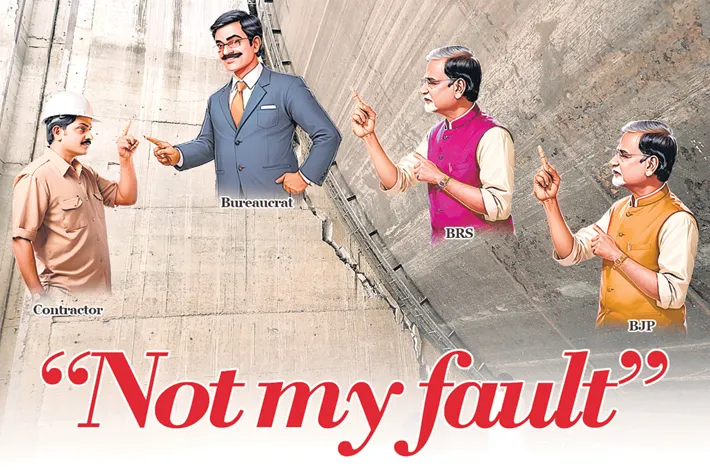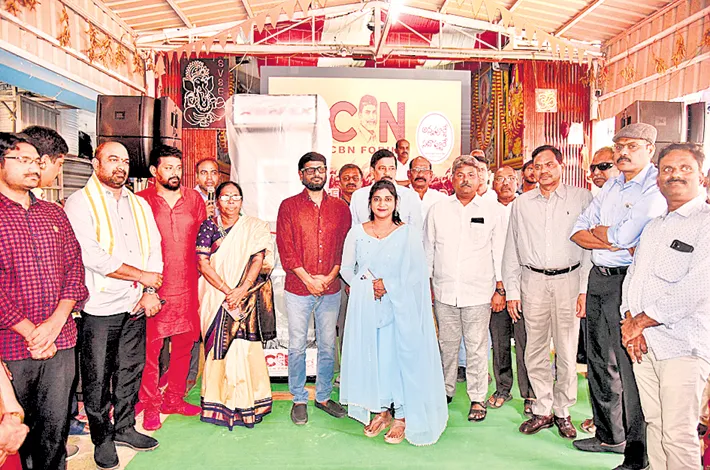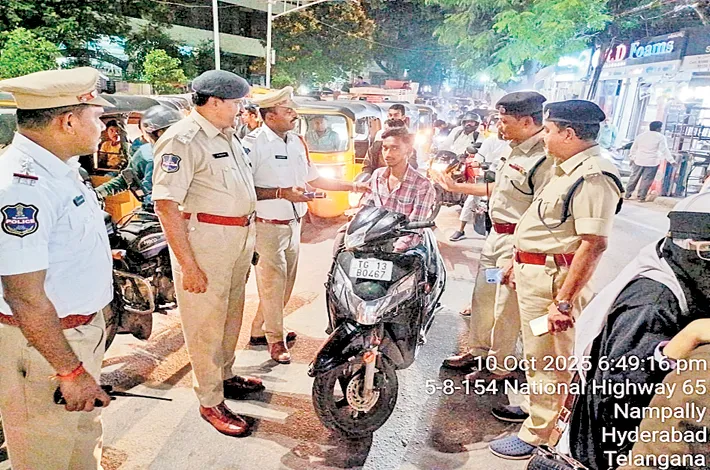Whose baby is it, anyway?
23-05-2025 12:00:00 AM

The Kaleshwaram Conundrum: A Rs 1.47 Lakh Crore Blame Game in Telangana
The Kaleshwaram Lift Irrigation Project (KLIP), once regarded and portrayed as a transformative engineering marvel for Telangana, has devolved into a Rs 1.47 lakh crore quagmire, entangled in structural failures, financial burdens, and a relentless political blame game. Conceived to harness the Godavari River’s waters to irrigate lakhs of acres and provide drinking water to drought-prone regions, the project was meant to secure Telangana’s agricultural future.
Instead, it stands as a stark symbol of ambition derailed by mismanagement, corruption allegations, and political indecision. As the Bharat Rashtra Samithi (BRS), Bharatiya Janata Party (BJP), and the Congress-led state government engage in a cycle of buck-passing, the project’s future remains uncertain, leaving Telangana’s farmers and taxpayers bearing the cost of a dream unfulfilled.
A Project marred by Controversy
The Kaleshwaram project, launched under the BRS government led by former Chief Minister K Chandrasekhar Rao (KCR), was promoted as the world’s largest lift irrigation scheme. With a staggering cost of Rs 1.47 lakh crore, as reported by the Comptroller and Auditor General of India (CAG), it promised to transform Telangana’s agricultural landscape through a complex network of reservoirs, canals, and pumping stations.
The project was a reimagined version of earlier irrigation plans, redesigned and executed under KCR’s leadership, with BRS leaders lauding it as a “man-made miracle” completed in record time. It aimed to irrigate over 18 lakh acres and provide drinking water to millions, positioning Telangana as a model for water management.
However, the project’s ambitious scale was soon overshadowed by allegations of corruption and structural deficiencies. Reports of collapsing reservoirs and other structural failures raised serious questions about the project’s design and execution. Critics, including opposition parties, argued that the haste to complete the project—often cited as a hallmark of BRS’s efficiency—compromised its quality. The financial burden, meanwhile, has been immense, with Telangana reportedly paying Rs 16,000 crore annually in interest on loans secured for the project, a figure that underscores the urgency of resolving its fate.
A Cycle of Deflection
The BRS, now in opposition after losing power in December 2023, has sought to distance itself from the project’s failures. Party leaders, including KCR and his key aides like KT Rama Rao and T Harish Rao, have deflected responsibility to irrigation officials and engineers. The BRS top leaders maintain that they wanted to implement the project on fast track to help lakhs of farmers and people in the state. They say including the then CM KCR would never want a faulty project or design. The officials, engineers and the implementing agencies like the Contractor should ensure that the project is constructed in a proper manner.
On the other hand, the officials, engineers and the implementing agencies who are responsible for the execution of the project, claim that they merely followed the government’s directives. These officials, in turn, argue they operated under intense political pressure, adhering to specifications and timelines set by the BRS leadership. This circular blame game has left accountability elusive, with no one within the BRS willing to take ownership of the project’s shortcomings.
The BJP, which played a significant role during the project’s development, has been equally evasive. From Prime Minister Narendra Modi, Home Minister Amit Shah, Water Resources Minister, the then Governors, several top BJP leaders have praised the Kaleshwaram project and its significance. Moreover, the BJP-led Central government granted environmental clearances, secured approvals from the Central Water Commission, and facilitated funding through public sector banks and financial institutions. In the same breath, during KCR’s tenure, prominent BJP leaders, including Prime Minister Narendra Modi,
Home Minister Amit Shah, and party president J.P. Nadda, were vocal in their criticism, branding Kaleswaram a “scam” and accusing the BRS of using it as a “personal ATM” to siphon off public funds. They promised swift action if voted to power, raising expectations of accountability. Union Minister of state Bandi Sanjay made a promise during the last poll campaign that if the BJP comes to power it would take action against the Kaleshwaram Scam accused KCR & Co.
Yet, since the Congress assumed power in Telangana, the BJP-led Central government has adopted a conspicuously neutral stance. Instead of offering concrete support or clarity, it has directed the state to evaluate the project and submit a report, effectively washing its hands of responsibility. This deflection has raised questions about the BJP’s commitment to resolving the issue, particularly given its earlier rhetoric.
Some analysts suggest the party’s reticence may stem from a desire to avoid alienating potential political allies in Telangana, where coalition dynamics remain fluid. Revanth Reddy as leader of the Congress during KCR regime had submitted petition along with evidence to the central and state BJP leaders to initiate an investigation against KCR and his family members. But nothing happened.
The Congress government, led by Chief Minister A. Revanth Reddy, came to power in December 2023 with a mandate to address the alleged corruption of the BRS regime, with Kaleshwaram as a centerpiece of its campaign. Reddy, who had accused KCR and his family of amassing illicit wealth through the project, swiftly ordered a judicial probe led by a retired Supreme Court judge to investigate its financial and structural failures. The move was hailed as a step toward accountability, raising hopes that the Congress would decisively tackle the project’s myriad issues.
However, more than a year and a half later, the state government appears to be down with indecision. No clear strategy has emerged on whether to repair, redesign, or abandon the project, despite its colossal cost to public coffers.
The monsoon season, which is going to start soon, is set to delay investigations and repair work, with experts estimating that a thorough probe could take an additional three to four months after November 2025. This prolonged inaction has drawn criticism from stakeholders, who demand that the Congress should act decisively. The state’s financial strain, exacerbated by the Rs 16,000 crore annual interest burden, makes the lack of progress all the more glaring.
A Project adrift amid Political Posturing
The human cost of this political standoff is significant. Farmers, who were promised reliable irrigation to transform their livelihoods, remain dependent on erratic monsoon rains. Taxpayers, meanwhile, bear the burden of servicing the project’s massive loans, with little to show for it. The project’s structural failures have rendered large parts of it non-functional, undermining its potential to deliver on its lofty promises. At Rs 1.47 lakh crore, Kaleshwaram represents one of Telangana’s largest public investments, yet its legacy hangs in the balance, tarnished by allegations of mismanagement and corruption.
The Kaleshwaram Lift Irrigation Project demands urgent action, whether through repairs, modifications, or a difficult decision to write it off as a costly misadventure. Breaking the cycle of blame and indecision requires political will, technical expertise, and a commitment to transparency—qualities that have been in short supply thus far. The Congress government must move beyond relying on the judicial probe and articulate a clear strategy for the project’s future. The BRS and BJP, for their part, must acknowledge their roles in the project’s development and failures, rather than deflecting responsibility.
Until the key players move beyond finger-pointing and the state government takes a firm stance, Kaleshwaram will remain a Rs 1.47 lakh crore enigma—a burden on Telangana’s aspirations and a testament to the perils of political posturing. The people of Telangana, who have invested their hopes and resources in this project, deserve answers, accountability, and a resolution. For now, Kaleshwaram remains nobody’s baby, adrift in a sea of political gamesmanship and bureaucratic inaction, with its promise of prosperity fading further into the distance.








